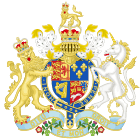Declaratory Act facts for kids

|
|
| Long title | An Act for the better securing the Dependency of His Majesty's Dominions in America upon the Crown and Parliament of Great Britain |
|---|---|
| Citation | 6 Geo 3 c 12 |
| Introduced by | Charles Watson-Wentworth |
| Territorial extent | British America and the British West Indies |
| Dates | |
| Royal assent | 18 March 1766 |
| Commencement | 18 March 1766 |
| Other legislation | |
| Repealed by | Statute Law Revision Act 1964 |
|
Status: Repealed
|
|
| Text of statute as originally enacted | |
The American Colonies Act 1766, often called the Declaratory Act, was a law passed by the Parliament of Great Britain. This law came out when another unpopular tax law, the Stamp Act 1765, was cancelled. It also changed the Sugar Act. Parliament cancelled the Stamp Act because American boycotts were hurting British businesses. The Declaratory Act was created to show that Parliament still had power. It said that Parliament's authority was the same in America as in Britain. It also stated that Parliament could make any laws for the American colonies.
Why the Act Was Passed
When the Stamp Act 1765 was introduced, it made colonists very angry. Representatives from many of the Thirteen Colonies met at the Stamp Act Congress. They questioned if a faraway government could tax them without their own representatives. The British Parliament faced colonies that refused to follow their new tax law.
Protests happened in the colonies. More importantly, British manufacturers also protested. They were losing money because colonists refused to buy British goods. All these problems led to the Stamp Act being cancelled. The British economy was also struggling after the Seven Years' War.
The Prime Minister, George Grenville, who created the Stamp Act, was replaced. The new Prime Minister was Charles Watson-Wentworth, 2nd Marquess of Rockingham. He was more friendly towards the colonies. He also disliked Grenville's policies. Rockingham invited Benjamin Franklin to speak to Parliament. Franklin explained that colonists opposed "internal taxes" like the Stamp Act. These were taxes on things happening inside the colonies. But they did not oppose "external taxes," which were duties on imported goods.
Parliament then agreed to cancel the Stamp Act. But only if the Declaratory Act was also passed. So, on March 18, 1766, Parliament cancelled the Stamp Act. On the same day, they passed the Declaratory Act.
This new law said that Parliament "had, and of right ought to have, full power and authority to make laws... to bind the colonies and people of America... in all cases whatsoever." This statement was very clear. It meant Parliament had total power to make laws for the colonies. This was true even though the colonists had no say in Parliament.
How Colonists Reacted
Many in Parliament thought this law meant they could still tax the colonies. But many colonists, who were celebrating the Stamp Act's repeal, did not see it that way. They thought they had won.
However, some colonists were very upset. The Declaratory Act hinted that more strict laws would come. This Act was almost exactly like the Irish Declaratory Act. That earlier law had put Ireland under the full control of the British Crown. This made some colonists fear the same would happen to them.
Even so, the colonists never directly asked for the Declaratory Act to be cancelled. They tried to find a peaceful solution with the British government until the very end.
One political thinker, Edward Mims, described the American reaction. He said that when Parliament declared it could pass any law it wanted, the colonies were horrified. Leaders like James Otis and Samuel Adams in Massachusetts, and Patrick Henry in Virginia, cried out against it. They felt this idea destroyed the freedom their British ancestors had fought for.
What Happened Later
Britain officially recognized the independence of the United States in 1783. But the Declaratory Act stayed in effect for other British colonies. These were colonies still under British rule in the western hemisphere.
The Act was not cancelled until 1964. By then, the few remaining British colonies in the West Indies had their own governments. These governments were set up under Parliament's authority.
After the Taxation of Colonies Act 1778 was passed during the American Revolution, Britain changed its approach. The British Parliament has never again tried to directly tax any of its colonies. Today, these are called British overseas territories. If the British government needed money from the colonies, it would ask the colonial governments themselves. This happened, for example, during the Anglo-German naval arms race in the early 1900s. The success of these requests varied.

